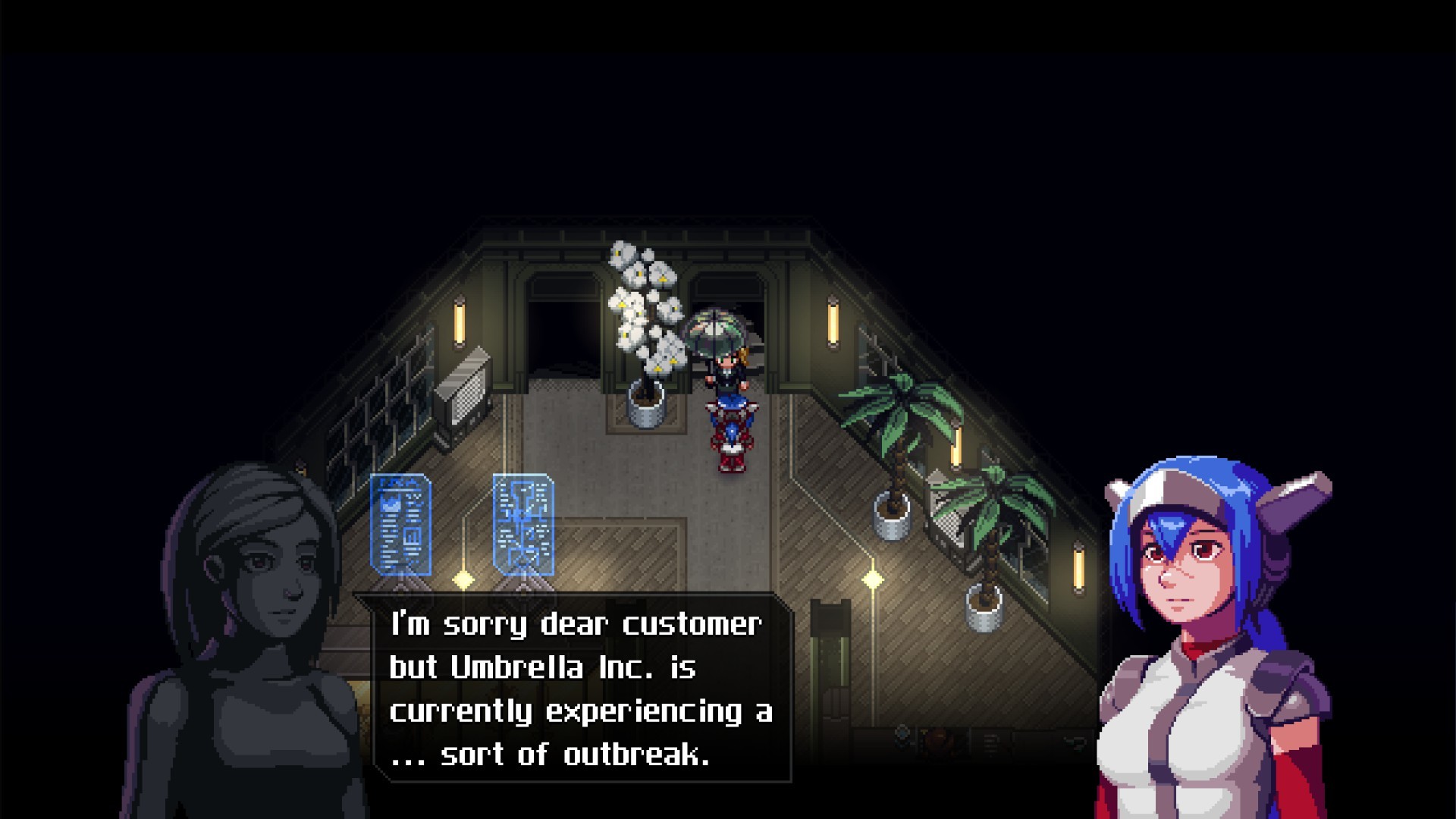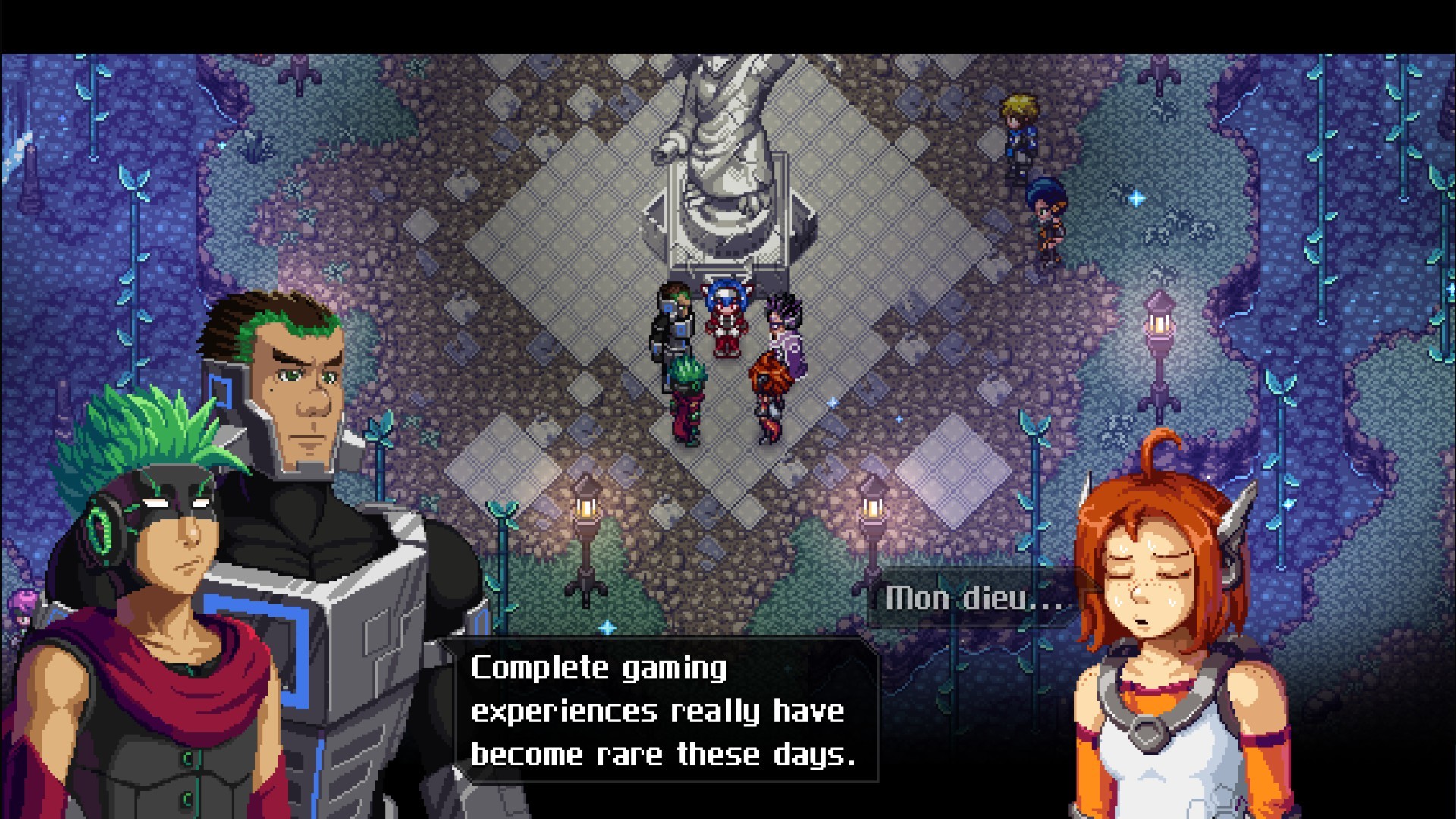A 'Spruce Goose' of an indie JRPG
CrossCode gets a lot "right," and achieves a lot in terms of mechanical and world design. But I hated playing it, just as much as I enjoyed it.
The game's prologue and opening chapter tease a cyberpunk thriller story, in the vein of Ready Player One or Snow Crash's "metaverse." You control an avatar in a game called CrossWorlds, similar to a present-day MMORPG, but -- this game isn't merely virtual. Set in a distant future with terraformed planets, instantaneous data transmission, and a lightweight but versatile "instant matter" which can be printed and reconfigured remotely: CrossWorlds is a physical place, populated with what are essentially 3D-printed players, NPCs, enemies, wildlife, houses...
It's a really cool sci-fi explanation for how you can die and respawn in-game, since avatars are just dolls being controlled remotely by off-world players. And how otherwise-impractical gameplay mechanics are made "real," like using combat techniques to create massive (augmented reality) explosions, or shooting (again, AR) laser pulses out of your avatar's hand to activate a switch.
It's clear from the introduction that something mysterious, even sinister, is going on in this world; particularly since your involvement in it isn't normal. The character behind your avatar has amnesia, and you join CrossWorlds with the help of a crew of people who are definitely up to something. Yet you must blend in as a CrossWorlds player, exploring the in-game world and making on-line friends as any other newbie would.
That "blending in" - joining a party with a random acquaintance, becoming part of their guild, and walking the content treadmill of the CrossWorlds game - then goes on, practically uninterrupted, for 15-20 hours. The external story, about your amnesia and the crew you're with, is nowhere to be found. So you take quests from NPCs, you forge through the wilderness to find ancient temples, you solve puzzles and defeat mighty bosses, level-up, invest in character attributes, buy equipment upgrades ...
Lacking development in that real-world thriller story, you're stuck playing the game within the game. Complete with other "players" who you'll often overhear conversing about their daily lives, or complaining about how long it's taking the CrossWorlds dev team to release an expansion pack.
To put it another way, imagine if Secret of Mana had a bunch of background characters who, at the end of every dungeon, threw out flavor text about their experience with the same boss fight you'd just finished. As an accurate simulation of real-world MMO experience, it deflates and devalues any narrative strength you might be tempted to attach to the meta-game world of CrossWorlds.
And that would be fine, if the "real" game of CrossCode would continue developing its cyberpunk thriller narrative. But it doesn't. This story goes totally dark for the first half of its running length.
CrossCode does include a lot of well-written dialog, from convincing characterization of its fake players to some videogame-reference humor. But the world it built within CrossWorlds wasn't interesting -- just mundane filler inbetween the "real" story.

The first half of CrossCode could have been cut down substantially, and the absence of its main story is the biggest reason. But not the only reason.
Probably the biggest and meatiest of CrossCode's gameplay mechanics is real-time combat: your avatar can hit enemies with both melee and ranged attacks, and as the game goes on, you'll unlock new abilities as well as elemental specializations. For example, when you see a red enemy coming at you, you should switch to your ice spec to inflict massive damage.
The combat controls responsively and fluidly, and develops a rich complexity as you level-up and face tougher foes. CrossCode progressively asks for more and more tactical intelligence from you, in figuring out an enemy's weaknesses on the fly, and swiftly avoiding their damaging attacks.
It's fast, exciting, and rewarding when you learn how to effectively defeat a new enemy. The problem I had with CrossCode's combat is that there's so much of it -- when you're traversing a new area, there are dozens upon dozens of encounters with the same few enemies, over and over again. The first few fights can be fun, but the countless more after that gradually become dull, and repetitive.
Now, to be clear: I wasn't forced to fight these enemies. A really smart facet of CrossCode's encounter design is that, except in specific scripted events, all enemies are non-hostile until you attack them. Meaning, you could just walk through an area without fighting anything. And if you're tired of combat, you can stop at any time.
... except that, by skipping combat in a new area, you'll inevitably be under-leveled for any upcoming scripted combat (like a dungeon boss). And you'll also be under-equipped, since you won't have the item or money drops necessary for new weapons and armor.
When you don't maintain pace with the game's suggested character level and equipment level, you're simply unable to keep up with scripted encounters. And that pace often feels like a real grind.
Another big mechanic in CrossCode is puzzle-solving. Your avatar can push blocks and hit switches - so, Zelda-style puzzles - and your ranged attack can also reflect against some surfaces, supporting light and mirror puzzle mechanics.
When these combine, i.e. push the blocks to the right positions for reflecting a shot to an ultimate destination, and then you throw in elemental specializations - like the ice shot freezing water into a reflective surface, or the lightning shot triggering a magnet that attracts a block! - CrossCode's puzzles get really satisfyingly complex. I legit enjoyed figuring a bunch of these out.
Unfortunately, like the combat, the problem with CrossCode's puzzles is that it forces too many of them upon you. All of the dungeon puzzles are mandatory - as they unlock doors that you need to go through - and there are just so damn many of them. The game's first dungeon was easily twice as large, and hence twice as lengthy, as I felt it should have been; same for the second dungeon.
Consequently, like combat: the dungeons are fun initially, but their puzzles become dull and boring as they wear on.
In its first half, CrossCode presents a lot of mechanics that work well individually, but are paced much too slowly. I'm impressed, in a way, that the game has so much content stuffed into it; particularly the puzzles -- I mean, someone designed all of these and they're all good! But I didn't want to do all of them in a row for three hours. And I was especially disappointed when my reward for finishing the dungeon didn't include anything about the main story.
There is, finally, a turning point around Chapter 7, where the real story comes back. The narrative pacing after this ... still isn't great, but is much better than before. It's a shame that I'd already become disenchanted with the combat and puzzle mechanics by then.
(It doesn't help that, just after this turning point, there is the biggest pre-dungeon area in the game, and then three immediately-consecutive dungeons.)
But in the back half, I found a new problem with CrossCode.
CrossCode's combat was always tactically demanding, even in the early game; but around the end of Chapter 8, that demand became intensely disrespectful of my time. I'm talking about encounters - both bosses and otherwise - with multiple phases over several minutes, that you have to restart from scratch if you die at the end. Encounters where a single slip-up may mean death, and the game will ask you to flawlessly repeat the last five minutes all over again.
For people who really like character-action games, this might not be a problem; like a DMC or Bayonetta, CrossCode continues to challenge you to perfect your techniques, all the way to the end. These techniques include not only finely honing your attack, evade, and block timings, but also exploiting "buffs" from consumable items, and gathering rare materials for equipment crafting (to surpass the gear you can buy).
But because of the frustrating die-and-retry repetition of these late-game encounters - and, perhaps, because I had become exhausted by the game already - I didn't rise to those challenges. I hit a wall, I think it was a fight with multiple Blue Rays?, and had just had enough; so I turned the game's difficulty sliders all the way down.
Said sliders reduce enemy attack damage and attack frequency; yet even with those dramatic reductions, I encountered enemies who barely gave me time to fight back -- and if they had been doing their full damage, I would have needed to evade or block damn near everything to survive.
I also turned down the slider for puzzle speed. Yeah: puzzle "speed." See, one aspect that puzzles come to rely on is real-time interaction with your wall-bouncing projectile -- for example, after your shot reflects off a block, then you hit a switch that moves the block somewhere else, so the shot can reflect off the same block again.
As the dungeon puzzles become more and more complex, the stakes they place on your time grow, just like the multi-phase combat encounters. If you screw up an eight-step puzzle on step 8, enjoy resetting the whole thing and trying again from 1! And, as with late-game enemies who can end you in an instant, the timing requirements on these puzzles leave no room for error. (Or, they did, until I tweaked the difficulty slider.)
I saw CrossCode through to the end, but was mostly just going through the motions. I enjoyed parts of it; slowed-down puzzles were still good brain-exercise, and scrounging up sidequests and exploring the world map continued to be mildly interesting.
But after being worn down by an onslaught of combat, eye-rollingly huge chunks of puzzles, and the game's surprising negligence toward its main story -- progressing through the rest of the game no longer felt exciting or fresh. It just felt like an obligation.
So when the game's ending wrapped up some plot threads, but not all of them; and a text prompt said that post-game epilogue content would be coming in the future; I couldn't even laugh.
All I could do was sigh, at this game I enjoyed a playable demo of three years ago, this game that rivals AAA productions with its amount of content - and often, the quality of its content - but somehow still didn't finish its story.

I fell in love with CrossCode's provocative introduction, but fell out of love with the MMO milieu that substituted for its story, and with its seemingly endless "practice makes perfect" approach to combat and puzzles.
If you're a big fan of those things, maybe CrossCode will be better, for you.
Better than: Final Fantasy XII, Mario & Luigi: Bowser's Inside Story
Not as good as: Child of Light, Timespinner
For better virtual-world meta-storytelling, see: Assassin's Creed and Saints Row IV